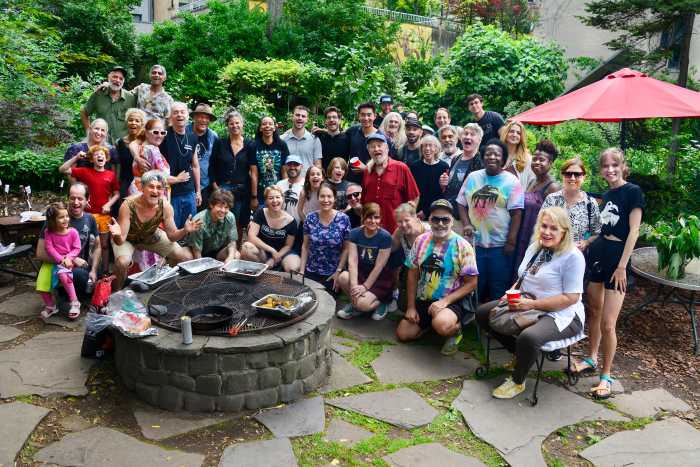By Patrick Hedlund
Don’t fence us out
A gated community on the Lower East Side? While the idea doesn’t seem too farfetched on today’s L.E.S., a group of concerned community members is fighting a plan to install fences around the Masaryk Towers, charging it will block pathways for pedestrians walking through the neighborhood.
The Coalition for Safety Without Gates on the Rivington Street Walkway recently met for the first time to discuss the proposal to erect fences around Masaryk Towers — bordered by Pitt, Stanton, Columbia and Delancey Sts. — cutting off the heavily trafficked walkway through the complex connecting Pitt and Columbia Sts.
Masaryk Towers is a Mitchell-Lama co-op that received federal funding from the Lower Manhattan Development Corporation in 2005 as part of an affordable-housing initiative. The complex’s co-op board has reportedly revisited the idea of installing the fences after initially considering it two years ago.
“If the gates go up, this could essentially put us out of business,” said Margarita Rosa, executive director of the Grand Street Settlement, which hosted the meeting of concerned community members. The social-service agency’s entrance is located on the corner of Pitt and Rivington Sts., and residents of the nearby Baruch Houses use the walkway to access the settlement’s senior services, as well as to travel to local stores, doctors offices and other basic services, the statement said.
“We are a community resource and these gates will prevent us from providing key services to those who need them,” Rosa added in a statement.
According to the coalition — made up of community-based organizations, local businesses, houses of worship, educators and residents — many are concerned that the gates hint at a move toward privatization at Masaryk Towers.
“It’s a way to get their property value to go up,” added Jessica Williamson, a Grand Street Settlement spokesperson.
Still Sunshine on Bowery
Score one for defenders of the Bowery. The Sunshine Hotel, a more-than-85-year-old flophouse next door to the massive New Museum building, will remain a safe haven for transients after the city’s Department of Housing Preservation and Development denied the owner’s request to redevelop the property as new condos. Citing a history of tenant harassment inside the three-building, single-room occupancy hotel at 241 Bowery, H.P.D. rejected Sunshine owner Roseann Carone’s bid for a “certificate of no harassment” to move forward with a planned demolition of the property for new condominiums.
According to an article in Monday’s New York Post, a judge accused the hotel’s operators of verbal abuse, threats against tenants and providing poor living conditions for the building’s 30 current residents. A report from Administrative Law Judge Julio Rodriguez stated that the actions “presented credible evidence that hotel management repeatedly offered buyouts, verbally and physically threatened, interrupted essential services, and engaged in other conduct against tenants.”
The owner must wait another three years before reapplying for the certificate, when the property might be the only undeveloped holdover left on the Bowery.
Falling Starbucks
Ubiquitous coffee conglomerate Starbucks has announced that 11 of its New York City stores will close as part of a plan to excise 600 nationwide amid slumping sales, though all of the caffeinated chain’s Downtown locations have so far been spared.
Of the six stores expected to shutter in Manhattan by mid-2009, all are located in Midtown and will be axed as a result of individual underperformance, according to a statement from the Seattle-based brand.
In total, 39 stores are set to close statewide starting this month and continuing through the middle of next year, including locations in Brooklyn, Queens and Long Island. Starbucks’ growth both Downtown and citywide has drawn the ire of preservationists in the East Village, who at one point could count three separate locations near Astor Place alone. The six closures mark only a fraction of Starbucks’ 170-strong presence in Manhattan.
The six closures mark only a fraction of Starbucks’ 170-store-strong presence in Manhattan, but some saw it as a possible shift away from chain stores in the city.
“It may point to the fact that the strategy of opening the same store on every other block is not a sustainable economic strategy even for these companies,” said Vicki Weiner, director of planning and preservation for the Pratt Center for Community Development, which partnered with the East Village Community Coalition to lead a study looking at strategies for how to restrict chains through zoning measures. “I think we already know it’s not a sustainable strategy for our community,” Weiner said.
Mixeduse@communitymediallc.com





































